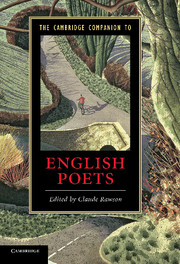Book contents
- Frontmatter
- Introduction
- 1 Geoffrey Chaucer
- 2 Thomas Wyatt
- 3 Edmund Spenser
- 4 William Shakespeare
- 5 John Donne
- 6 Ben Jonson
- 7 George Herbert
- 8 John Milton
- 9 Andrew Marvell
- 10 John Dryden
- 11 Jonathan Swift
- 12 Alexander Pope
- 13 William Blake
- 14 Robert Burns
- 15 William Wordsworth
- 16 Samuel Taylor Coleridge
- 17 George Gordon, Lord Byron
- 18 Percy Bysshe Shelley
- 19 John Keats
- 20 Alfred Lord Tennyson
- 21 Robert Browning
- 22 Emily Brontë
- 23 Christina Rossetti
- 24 Thomas Hardy
- 25 William Butler Yeats
- 26 D. H. Lawrence
- 27 T. S. Eliot
- 28 W. H. Auden
- 29 Philip Larkin
- Further Reading
- Index
5 - John Donne
Published online by Cambridge University Press: 28 May 2011
- Frontmatter
- Introduction
- 1 Geoffrey Chaucer
- 2 Thomas Wyatt
- 3 Edmund Spenser
- 4 William Shakespeare
- 5 John Donne
- 6 Ben Jonson
- 7 George Herbert
- 8 John Milton
- 9 Andrew Marvell
- 10 John Dryden
- 11 Jonathan Swift
- 12 Alexander Pope
- 13 William Blake
- 14 Robert Burns
- 15 William Wordsworth
- 16 Samuel Taylor Coleridge
- 17 George Gordon, Lord Byron
- 18 Percy Bysshe Shelley
- 19 John Keats
- 20 Alfred Lord Tennyson
- 21 Robert Browning
- 22 Emily Brontë
- 23 Christina Rossetti
- 24 Thomas Hardy
- 25 William Butler Yeats
- 26 D. H. Lawrence
- 27 T. S. Eliot
- 28 W. H. Auden
- 29 Philip Larkin
- Further Reading
- Index
Summary
John Donne (1572–1631) has been called the greatest love-poet in the English language, but this category does not adequately describe either the variety or the complexity of his poetry. Indeed, in the late seventeenth and the eighteenth century, his ‘metaphysical wit’ was thought to compromise his stature as a love-poet. Deaf to the seductive effect that intellect or wit can have on readers (female as well as male), John Dryden condemned Donne for ‘perplex[ing] the Minds of the Fair Sex with nice Speculations of Philosophy, when he shou’d engage their hearts’. Later, Samuel Johnson coined the term ‘the metaphysical poets’ and described metaphysical wit as a kind of ‘discordia concors’ that discovered ‘occult resemblances in things apparently unlike’, yoking together ‘the most heterogeneous ideas … by violence’.
Donne lived and wrote when people were more likely to see correspondences between things that would come to seem discrete (for example, the human body or microcosm and the macrocosm of the world), when the line between the private and public realms had not yet been sharply drawn, when spiritual and secular realms were intertwined. But there were challenges to the older order, and resulting scepticism about received truths. Galileo confirmed Copernicus’s hypothesis that the earth was not the centre of the universe. A new experimental science was developing, that sought to discover natural laws according to which the physical world worked. People were interested in the discovery of the heavens, of nature, of the Americas.
- Type
- Chapter
- Information
- The Cambridge Companion to English Poets , pp. 104 - 121Publisher: Cambridge University PressPrint publication year: 2011

